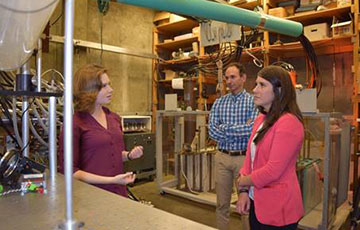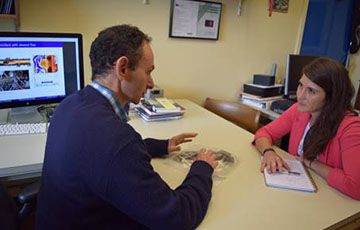
By: William E. Boeing Department of Aeronautics & Astronautics
On Sept. 2, Rachel Peterson from Senator Patty Murray’s office visited campus to tour the UW A&A labs and receive an update on current research relevant to the U.S. Senate Appropriations Subcommittee on Energy and Water. Peterson met with A&A professor Uri Shumlak to hear about advances in plasma science and explore the potential impact of fusion energy on the environment and in space.
The motivation behind fusion energy is both simple and existential. We need to find a way to produce clean, efficient, reliable power without exhausting resources or polluting the environment. Shumlak’s lab – recently awarded the “2016 UW Greenest Lab Award” – is addressing this challenge by using magnetic confinement to compress the plasma using a sheared-flow stabilize Z-pinch concept. This approach eliminates the need for the massive magnetic field coils typically used in fusion energy experiments. Magnetic coils are the primary cost driver, diminishing commercial viability. At the UW, our plasma scientists are exploring better ways to achieve “the reaction that could save the world” with much simpler devices. (For reference, just 1 gram of DT fusion fuel has the energy content of 2,000 gallons of oil.)

Plasma science offers solutions in space as well. For example, current satellites typically have a 10-12 year lifespan before they run out of propellant and can no longer maintain their orbit. Plasma propulsion devices can achieve very high propellant exhaust velocities in space, which reduces the required amount of propellant and extends the window in which a satellite will be profitable. This impacts major industries like telecommunications, Internet, GPS and global imagery. Plasma thrusters and fusion energy are also likely to be essential for human space travel beyond our planet.
Past research funding has been provided by the U.S. Department of Energy and the Advanced Research Projects Agency-Energy, but long-term vision is necessary to achieve commercial sustainability. The UW is proud to be located in the great green state of Washington and grateful to our Senate representatives for their involvement and support.
--
To learn more about plasma research in our department, visit Research Area: Plasma Science.